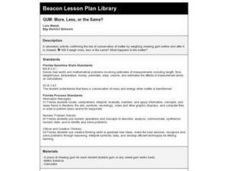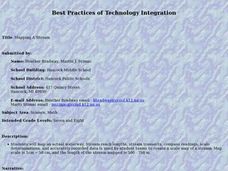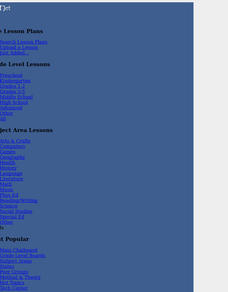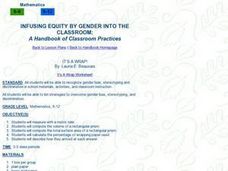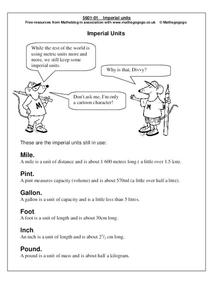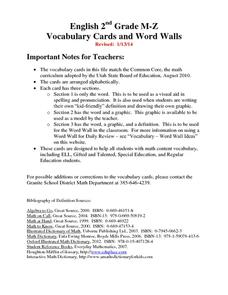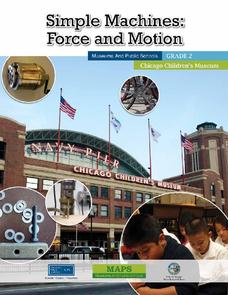Curated OER
Triangle Explorer
Students compute the area of triangles in a computer program. In this measurement lesson plan, students complete 5 easy, 5 medium, and 5 hard problems.
Curated OER
Perplexing Perimeters
In the process of constructing their own "rulers" Students develop a sense of the size of a centimeter and meter. Students select the appropriate "ruler" for the tasks. Finally, 3rd graders calculate the perimeter of objects using...
Curated OER
GUM: More, Less, or the Same?
Young scholars confirm the law of conservation of matter by weighing chewing gum before and after it is chewed.
Curated OER
Unit Conversions
In this unit conversions worksheet, students convert units such as kilometers, meters, centimeters, feet, hours, and minutes. Students complete 22 problems.
Curated OER
What is a Pico?
Students label objects in their classroom based on mass and volume using the metric system. They examine the relationship between the numerical value and the corresponding metric unit.
Curated OER
Wood Identification Based on Density
Eighth graders measure irregular and regular shaped solids. In this investigative lesson students calculator volume, mass and density of wood and blocks.
Curated OER
How Tall in the Fall?
First graders use nonstandard measurement to measure. After reading Inch by Inch, 1st graders pair measure leaves that they have collected. They glue their leaves onto tag board to make a display.
Curated OER
Average Looking
Students use measurements of their classmates to find the average (means and modes) of their facial features. They use their findings to create a three-dimensional "class head." Examples and assessment materials are included.
Curated OER
DENSITIES OF REGULARLY SHAPED SOLIDS
Students calculate the volumes of regularly shaped objects from measurements of their dimensions. They use several formulas and measure different objects to calculate the density, volume, and mass of the objects selected or assigned.
Curated OER
Focus: Word Processing
Sixth graders explore the basic units and prefixes of the metric system. They select a fairy tale or nursery rhyme to revise and rewrite with blanks where the metric system terminology can be inserted. Students, following given...
Curated OER
Discovering Pi
Fourth graders are introduced and experiment with the concept of pi. Using this information, they discover the relationship between the circumference and diameter of circles. In groups, they practice measuring the circumference of...
Curated OER
Keeping Warm
Fifth graders measure the temperature of water using a thermometer. They record the temperatures of water on a chart. Students use the temperature data to determine which materials are the best conductors of heat. They discuss their...
Curated OER
Mapping A Stream
Students participate in mapping an actual waterway. They include reach lengths, transects, compass reading, and scale determinations. They include windfalls, plant cover, types of streambed composition, and landmarks such as trees and...
Curated OER
Understanding Cloud Formation
Students explore air and clouds by watching demonstration. They perform an experiment to measure air pressure changes.
Curated OER
BYAH Word Search Puzzle
In this math worksheet, students look for the words in the puzzle that are related to the theme of measurement. Spelling skills are worked on.
Curated OER
How big is a whale
Young scholars research the size of whales using print books or the internet. Students do the research in groups. They compare and graph the results.
Curated OER
Mathematics: It's a Wrap!
Learners calculate the amount of wrapping paper needed to wrap boxes. They describe how they determined their answers.
Curated OER
Imperial Units
In this imperial units worksheet, students read the definitions to the following list of imperial units: mile, pint, gallon, foot, inch and pound.
Curated OER
It's About Time!
Young scholars examine concept of time, and explore difference between analog and digital clocks; students make art project to represent time and create a time-story problem and solution.
Curated OER
Vocabulary Cards 2nd Grade M-Z
Math vocabulary has never been easier to understand! Use vocabulary cards to bring word walls to your classroom, helping kids make the connection between important math terms and easy-to-understand illustrations.
Curated OER
Water Pressure Blaster
Third graders complete an experiment to introduce them to the concept of water pressure. In this water pressure lesson plan, 3rd graders create pressure in a water bottle and observe the force of water that is created.
Chicago Children's Museum
Simple Machines: Force and Motion
Get things moving with this elementary science unit on simple machines. Through a series of nine lessons including teacher demonstrations, hands-on activities, and science experiments, young scientists learn about forces, motion,...
Curated OER
Maps and Modes, Finding a Mean Home on the Range
Fifth graders investigate data from maps to solve problems. In this data lesson, 5th graders study maps and collect data from each map. Students present their data in a variety of ways and calculate the mode, mean, median, and range.
Curated OER
Team Apollo
Seventh graders brainstorm about problems with a school track. They research different possibilities for a solution. They test different track materials with erosion, durability, abrasiveness and resiliency. They determine the area,...




